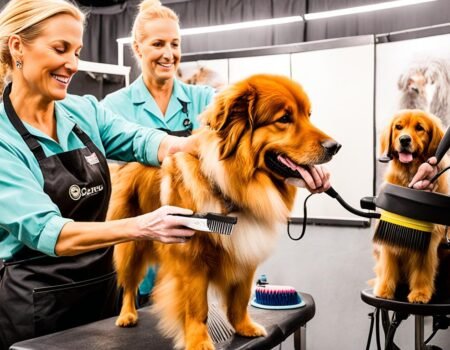Did you know that the average lifespan of a French Bulldog is around 10-12 years? That’s right, these adorable and popular companion dogs have a relatively short lifespan compared to many other breeds.
But why is the lifespan of French Bulldogs shorter? What factors can influence it? And what can you do to ensure your French Bulldog lives a long and healthy life? In this article, we will explore the fascinating world of French Bulldog lifespans and provide you with valuable insights and facts to help you understand and care for your furry friend.
Key Takeaways:
- The average lifespan of a French Bulldog is around 10-12 years.
- Diet, exercise, veterinary care, and breed-specific health conditions can affect the lifespan of a French Bulldog.
- Providing a balanced diet, regular exercise, and proper veterinary care can help maintain the health of a French Bulldog and potentially extend their lifespan.
Factors That Affect the French Bulldog Lifespan
When it comes to the lifespan of a French Bulldog, several factors come into play. It’s important to consider these factors to ensure the longevity and well-being of your furry friend. Let’s explore the key elements that can influence the age span of a French Bulldog.
Diet and Nutrition
The diet of a French Bulldog plays a vital role in their overall health and lifespan. Providing a balanced and nutritious diet is essential to support their immune system, maintain a healthy weight, and prevent potential health issues that could impact their longevity. High-quality dog food specifically formulated for French Bulldogs, which meets their nutritional needs, is a great starting point.
Exercise and Activity
Regular exercise is crucial for the well-being and lifespan of a French Bulldog. While they may not require the same level of physical activity as high-energy breeds, they still benefit from daily exercise to maintain a healthy weight, prevent obesity-related problems, and promote good cardiovascular health.
Veterinary Care
Providing consistent and comprehensive veterinary care is essential to ensure the health and well-being of your French Bulldog. Regular check-ups, vaccinations, preventative treatments for fleas and ticks, and screenings for breed-specific health conditions can all contribute to a longer lifespan.
Breed-Specific Health Conditions
French Bulldogs are prone to certain breed-specific health conditions that can impact their lifespan. These include respiratory issues, skin allergies, eye problems, and joint and bone disorders. Being proactive in identifying and managing these conditions with the help of your veterinarian can help extend the lifespan of your French Bulldog.
Diet and Nutrition for French Bulldogs
The diet of a French Bulldog is a crucial factor that influences their overall health and lifespan. Providing them with a high-quality, nutritionally balanced dog food is essential for promoting their well-being and longevity. Feeding them the right portion size is equally important to prevent obesity, which can shorten their lifespan.
When selecting dog food for your French Bulldog, look for options that contain high-quality ingredients, including lean proteins, healthy fats, and a balance of carbohydrates. Avoid foods with fillers, artificial additives, and excessive amounts of preservatives.
It is recommended to consult with a veterinarian to determine the appropriate portion size for your French Bulldog based on their age, weight, and activity level. Overfeeding can lead to weight gain, which puts unnecessary strain on their joints and organs and can negatively impact their healthspan.
Essential Nutrients for French Bulldogs
To ensure that your French Bulldog receives all the necessary nutrients, their diet should include:
| Nutrient | Function | Food Sources |
|---|---|---|
| Protein | Building blocks for muscles, tissues, and enzymes | Lean meats, fish, poultry, eggs, legumes |
| Omega-3 Fatty Acids | Promoting healthy skin, coat, and joint health | Fish oil, flaxseed, chia seeds |
| Fiber | Aiding digestion and maintaining bowel regularity | Fruits, vegetables, whole grains |
| Calcium | Supporting bone health and muscle function | Dairy products, green leafy vegetables |
| Antioxidants | Protecting cells from damage and supporting immune health | Fruits, vegetables, berries |
Remember to provide your French Bulldog with fresh water at all times to keep them properly hydrated. It is also a good idea to consult with a veterinarian or a canine nutritionist to ensure that your French Bulldog’s diet meets their specific needs for optimal health and a longer life.
Exercise and Activity for French Bulldogs
While French Bulldogs do not require as much exercise as high-energy working breeds, regular physical activity is essential for maintaining their health and well-being. Daily short walks and play sessions with their favorite toys are recommended to keep them active and prevent weight gain. However, it’s important to note that French Bulldogs have a brachycephalic respiratory system, which puts them at a higher risk of breathing problems. Therefore, it’s crucial not to over-exercise them to avoid any potential health issues.
French Bulldogs thrive on mental stimulation as well, so incorporating interactive activities into their exercise routine can be beneficial. Puzzle toys that encourage problem-solving or training sessions that focus on obedience and agility can help keep their minds engaged and satisfy their need for mental stimulation.
Exercise Tips for French Bulldogs:
- Ensure daily exercise: French Bulldogs should engage in at least 20-30 minutes of exercise each day, divided into shorter sessions to prevent them from becoming overly fatigued.
- Utilize indoor activities: On hot or cold days or when outdoor exercise is not feasible, indoor activities such as hide-and-seek or using indoor play equipment can provide a fun exercise alternative.
- Monitor their breathing: Pay close attention to their breathing during exercise, and if they start to show signs of excessive panting or struggle to catch their breath, it’s crucial to stop and rest immediately.
- Consider swimming: Swimming is an excellent low-impact exercise for French Bulldogs, as it provides a full-body workout without putting stress on their joints. However, always supervise them closely in the water.
Veterinary Care for French Bulldogs
Veterinary care is essential for maintaining the health and enhancing the longevity of your French Bulldog. Regular check-ups and routine examinations are important for monitoring their overall well-being. Vaccinations, flea and heartworm control, and dental health maintenance also play a crucial role in ensuring your French Bulldog’s optimal health.
During veterinary visits, your veterinarian will assess your French Bulldog’s overall health, update vaccinations, and conduct routine blood tests to detect any underlying health conditions early on. This proactive approach can help prevent potential complications and contribute to a longer and healthier life.
Aside from routine care, it is important to stay vigilant and observe your French Bulldog for any signs of illness or discomfort. French Bulldogs are prone to certain breed-specific health conditions such as brachycephalic airway syndrome and eye issues like cataracts and ulcers. Regular veterinary check-ups allow for early detection and management of these conditions.
Table: Common Veterinary Care Procedures for French Bulldogs
| Procedure | Frequency |
|---|---|
| Annual vaccinations | Annually |
| Heartworm and flea control | Monthly |
| Dental examinations and cleanings | Bi-annually |
| Blood tests for overall health | Annually |
In addition to regular veterinary care, maintaining a healthy lifestyle for your French Bulldog is essential. This includes providing a balanced diet, regular exercise, and mental stimulation. These practices, coupled with routine veterinary check-ups, contribute to the overall health and lifespan of your beloved French Bulldog.
Common Health Issues in French Bulldogs
French Bulldogs are adorable and affectionate companions, but they are also prone to certain health conditions. It’s important to be aware of these issues to provide the best possible care for your furry friend.
One common health problem in French Bulldogs is brachycephalic airway syndrome. Due to their short snouts, French Bulldogs can experience breathing difficulties, which can range from mild to severe. This condition can lead to respiratory distress, excessive snoring, and difficulty regulating body temperature.
French Bulldogs are brave little troopers, but their unique anatomy can make it challenging for them to breathe comfortably.
Another health issue that French Bulldogs may face is eye problems, including cataracts and ulcers. Cataracts are the result of clouding in the lens of the eye, leading to impaired vision. Ulcers, on the other hand, are painful sores that can develop on the surface of the eye. Regular eye examinations and prompt treatment are essential to maintain their ocular health.
As French Bulldogs age, they are also susceptible to age-related health problems such as hip dysplasia and intervertebral disc disease. Hip dysplasia is a degenerative condition that affects the hip joints, causing pain and mobility issues. Intervertebral disc disease, on the other hand, affects the discs between the vertebrae, leading to spinal cord compression and potentially paralysis.
These health issues, if left untreated, can significantly impact a French Bulldog’s quality of life and lifespan. It is crucial to be proactive and attentive to their healthcare needs, ensuring regular veterinary check-ups and addressing any health concerns promptly.
Common Health Issues in French Bulldogs
| Health Issue | Description |
|---|---|
| Brachycephalic Airway Syndrome | Airway obstruction due to short snouts, leading to breathing difficulties |
| Eye Problems | Cataracts, ulcers, and other eye-related conditions that can affect vision |
| Hip Dysplasia | Degenerative condition affecting the hip joints, causing pain and reduced mobility |
| Intervertebral Disc Disease | Compression of spinal discs, potentially leading to paralysis |
Despite these health issues, with the right care and attention, French Bulldogs can still lead happy and fulfilling lives. Regular veterinary care, a balanced diet, and adequate exercise can contribute to their overall well-being and potentially extend their lifespan.
Tips for Keeping Your French Bulldog Healthy
In order to maintain the health and potentially extend the lifespan of your French Bulldog, there are several important steps you can take. By providing a balanced diet, regular exercise, proper veterinary care, and incorporating nutritional supplements, you can ensure your furry friend leads a happy and healthy life.
Diet and Nutrition
A well-rounded diet is essential for the overall health and longevity of your French Bulldog. Feeding them a high-quality, nutritionally balanced dog food is crucial in providing them with the necessary nutrients to thrive. Be mindful of portion sizes to prevent obesity, which can shorten their lifespan. Additionally, consider adding nutritional supplements like bone broth toppers and omega oil to further support their well-being and enhance their overall healthspan.
Regular Exercise
While French Bulldogs may not require as much exercise as high-energy working breeds, they still benefit from regular physical activity. Daily short walks and play sessions with their favorite toys can help them maintain a healthy weight and prevent weight gain. However, it’s important to be cautious not to over-exercise them due to their brachycephalic respiratory system, as they are at a higher risk for breathing problems. Always prioritize their safety and well-being during exercise.
Proper Veterinary Care
Regular check-ups and veterinary care are vital in ensuring the health and well-being of your French Bulldog. Routine examinations, vaccinations, flea and heartworm control, dental health maintenance, and early detection of potential health problems are all essential for extending their lifespan. By staying proactive and keeping up with regular veterinary visits, you can address any health issues promptly and optimize your French Bulldog’s healthspan.
“Keeping your French Bulldog healthy involves providing the right nutrition, prioritizing regular exercise, and ensuring they receive proper veterinary care. Following these tips can help promote their well-being and potentially extend their lifespan.”
Summary of Tips:
- Provide a balanced diet with high-quality dog food
- Be mindful of portion sizes to prevent obesity
- Incorporate nutritional supplements like bone broth toppers and omega oil
- Engage in regular exercise with short walks and play sessions
- Exercise caution to prevent overexertion due to the brachycephalic respiratory system
- Maintain routine veterinary visits for check-ups, vaccinations, and early detection of health issues
| Tips for Keeping Your French Bulldog Healthy |
|---|
| Provide a balanced diet with high-quality dog food |
| Be mindful of portion sizes to prevent obesity |
| Incorporate nutritional supplements like bone broth toppers and omega oil |
| Engage in regular exercise with short walks and play sessions |
| Exercise caution to prevent overexertion due to the brachycephalic respiratory system |
| Maintain routine veterinary visits for check-ups, vaccinations, and early detection of health issues |
By following these tips and being proactive in your French Bulldog’s care, you can significantly contribute to their overall health and potentially extend their lifespan. Remember, a healthy and happy French Bulldog is a cherished companion for years to come.
The Impact of Genetics on a French Bulldog’s Lifespan
The genetic background of a French Bulldog can have a significant impact on their lifespan and predisposition to certain health conditions.
When adopting or purchasing a French Bulldog, it is crucial to inquire about the health history of both the dog and their parents. This information can provide valuable insight into potential health concerns and help you make an informed decision.
Reputable breeders should have comprehensive information about the genetic background of their French Bulldogs. They can provide details about any hereditary health issues that may be present in their breeding lines.
| Genetic Factors | Effect on Lifespan |
|---|---|
| Inherited Diseases | Some genetic conditions can shorten the lifespan of French Bulldogs, such as brachycephalic airway syndrome, eye issues, and age-related problems like hip dysplasia. |
| Overall Health | French Bulldogs with a solid genetic foundation tend to be healthier and have a higher chance of living a longer life. |
By understanding the genetic factors that influence a French Bulldog’s lifespan, you can choose a dog with a healthier genetic background and minimize the risk of hereditary health problems.
Note: The image above is for illustrative purposes only and does not depict any specific dog or breeding situation.
Heat Sensitivity and its Effect on French Bulldog Lifespan
French Bulldogs are known for their adorable appearance and affectionate nature, but they also have a unique vulnerability to heat sensitivity (Fourth source). Due to their short snouts and compact facial structure, French Bulldogs can struggle to regulate their body temperature effectively, making them more susceptible to heat-related health issues (Fourth source).
To ensure the well-being and longevity of your French Bulldog, it is essential to take precautions to protect them from excessive heat. Here are some tips to help keep your furry companion safe:
- Provide plenty of fresh water for your French Bulldog to stay hydrated, especially during hot weather.
- Create a cool and well-ventilated space for your French Bulldog to rest, preferably in an air-conditioned environment.
- Avoid leaving your French Bulldog in a car or confined space without proper ventilation, as it can quickly become dangerously hot.
- Plan outdoor activities during the cooler parts of the day to minimize heat exposure.
- Use cooling mats or provide a shaded area for your French Bulldog to relax in when outdoors.
It is crucial to pay close attention to your French Bulldog’s behavior during hot weather. Symptoms of heat exhaustion or heatstroke may include excessive panting, drooling, weakness, vomiting, and collapse. If you notice any of these signs, seek immediate veterinary assistance.
By being aware of your French Bulldog’s heat sensitivity and taking proactive measures to prevent overheating, you can help safeguard their health and extend their lifespan (Fourth source).
Conclusion
The average lifespan of a French Bulldog is around 10-12 years. However, with proper care and attention to factors like diet, exercise, veterinary care, and genetic background, their lifespan can potentially be extended. It is important to provide a balanced diet, regular exercise, and routine veterinary check-ups to maintain the health and longevity of a French Bulldog.
By being proactive and informed about their unique health needs, you can give your French Bulldog the best chance at a long and happy life. Remember to provide them with a high-quality, nutritionally balanced diet, engage in regular exercise, and schedule routine check-ups with a veterinarian. These steps can help ensure that your French Bulldog remains healthy and potentially extends their lifespan.
Genetics also play a role in a French Bulldog’s lifespan. When adopting or purchasing a French Bulldog, it is important to inquire about their health history and the health history of their parents. Reputable breeders should have this information available, which can provide insight into potential health concerns and help you make informed decisions about your pet’s care.
Lastly, it’s essential to be mindful of their heat sensitivity. French Bulldogs are highly sensitive to heat and can suffer from heat-related health issues. Make sure to provide them with plenty of fresh water and a cool place to stay, especially during hot weather, to prevent dehydration and other heat-related problems.
FAQ
What is the average lifespan of a French Bulldog?
The average lifespan of a French Bulldog is around 10-12 years.
What factors can affect the lifespan of a French Bulldog?
Factors such as diet, exercise, veterinary care, and breed-specific health conditions can affect the lifespan of a French Bulldog.
How can I help extend the lifespan of my French Bulldog?
Providing a wholesome and balanced diet, regular exercise, and proper veterinary care can help maintain the health of a French Bulldog and potentially extend their lifespan.
What role does diet play in a French Bulldog’s lifespan?
The diet of a French Bulldog plays a crucial role in their overall health and lifespan. Feeding them a high-quality, nutritionally balanced dog food and offering the proper portion size is important to prevent obesity, which can shorten their lifespan.
How much exercise do French Bulldogs need?
While French Bulldogs do not need as much exercise as high-energy working breeds, they still require regular physical activity to maintain their health. Daily short walks and play sessions with favorite toys are recommended to keep them active and prevent weight gain. However, it’s important not to over-exercise them due to their brachycephalic respiratory system, as they are at higher risk for breathing problems.
Why is veterinary care important for French Bulldogs?
Regular check-ups and veterinary care are crucial for ensuring the health and longevity of a French Bulldog. Routine examinations, vaccinations, flea and heartworm control, dental health maintenance, and early detection of health problems can contribute to a longer lifespan for a French Bulldog.
What are some common health issues in French Bulldogs?
French Bulldogs are prone to certain health conditions, including brachycephalic airway syndrome, eye issues like cataracts and ulcers, and age-related problems like hip dysplasia and intervertebral disc disease. These issues, if left untreated, can affect a French Bulldog’s quality of life and lifespan.
What can I do to keep my French Bulldog healthy?
To maintain the health and potentially extend the lifespan of a French Bulldog, it is important to provide them with a balanced diet, regular exercise, and proper veterinary care. Adding nutritional supplements like bone broth toppers and omega oil can also contribute to their overall health.
How does genetics impact a French Bulldog’s lifespan?
The genetic background of a French Bulldog can influence their lifespan and susceptibility to certain health conditions. It is important to inquire about the health history of a French Bulldog and their parents when adopting or purchasing from a breeder. Reputable breeders should have this information available to provide insight into potential health concerns.
Are French Bulldogs sensitive to heat?
French Bulldogs are highly sensitive to heat and can suffer from heat-related health issues. It is important to provide them with plenty of fresh water and a cool place to stay to prevent dehydration and other heat-related problems.
What is the conclusion regarding French Bulldog lifespan?
The average lifespan of a French Bulldog is around 10-12 years, but with proper care and attention to factors like diet, exercise, veterinary care, and genetic background, their lifespan can potentially be extended. Providing a balanced diet, regular exercise, and routine veterinary check-ups are essential for maintaining the health and longevity of a French Bulldog. By being proactive and informed about their unique health needs, you can give your French Bulldog the best chance at a long and happy life.











No Comment! Be the first one.